#gina apostol
Explore tagged Tumblr posts
Text
It's not the fault of the student who has not read Nick Joaquin, who does not know "May Day Eve." I think it's a structural issue. I think it's an education issue. I think it's a political issue. I think it's a government issue. Shame on the government. Shame on the educational institutions that don't move the Filipinos to read the work of their own writers from the time they're little. I grew up reading Philippine Journal of Education in a really backwards, teeny tiny river town in Leyte. Not even in Tacloban, in my mom's hometown Barugo, Leyte. [...] But in that hometown, people had, my aunt had Philippine Journal of Education. I would read the stories of Nick Joaquin there... and so many books were available to me. Martial Law really changed the kinds of books that were offered to me. From reading the Victorian Era poets, and [other] English language poets, and Nick Joaquin, we ended up reading stories about aswang... I don't know what happened with my English education... But I would always go to have generosity with the Filipino who is the victim here. They're not the ones who are perpetuating their own ignorance. It is the government that's doing that; it is the schools. And I think it is our job to have that generosity for the Filipino reader. To say "the Filipino is not a reading public" already puts the burden on that Filipino. The burden should be on the government, that should have a better educational system for all of us.
Gina Apostol, in MCAD TK’s Rediscovering Nolledo: Reading But for the Lovers
76 notes
·
View notes
Text
Winding Up the Week #385
An end of week recap “To be ill adjusted to a deranged world is not a breakdown.” – Jeanette Winterson This is a post in which I summarise books read, reviewed and currently on my TBR shelf. In addition to a variety of literary titbits, I look ahead to forthcoming features, see what’s on the nightstand and keep readers abreast of various book-related happenings. CHATTERBOOKS >> If you are…
0 notes
Text
Insurrecto by Gina Apostol

And the power of that— the certainty of his director's vision gives her invidia: a disease of empathy. It's that envy of the artist that arises in certain readers: a visceral connivance with his dreams matched only by the desire to kill him for fulfilling them. (p. 21)
***
As she reads, Magsalin keeps track of her confusions, annotating each mixed-up chapter as she goes, taking out from her bag an actual notebook and a fountain pen, a pale green Esterbrook, bought on eBay. In the notebook, she includes problems of continuity, the ones not explained by hopscotching chapters; issues of anachronism, given the short life-span of the male subject (1940-1977) contrasted against the women, who have superpowers: longevity and dispassion; words repeated as if they had been spilled and reconstituted then placed on another page; a stage set of interchangeable performers with identical names, or maybe doubles or understudies as they enter and exit the stage; an unexplained switch of characters' names in one section; and the problem of lapsed time in which simultaneous acts of writing are the illusions that sustain a story.
At times, she feels discomfort over matters she knows nothing about, and Magsalin hears rising up in her that quaver that readers have, as if the artist should be holding her hand as she is walked through the story.
But she rides the wave, she checks herself.
A reader does not need to know everything.
How many times has she waded into someone else's history, say the mysteries of lemon soaps and Irish pubs in Dedalus's Dublin, or the Decembrists' plot in Dostoyevsky's The Devils, or Gustave Flaubert's Revolution of 1848 in what turns out to be one of her favorite books, Sentimental Education, and she would know absolutely nothing about the scenes, the historical background that drives them, the confusing cultural details, all emblematic, she imagines, to the Irish or the Russians or the French, and not really her business and yet she dives in, to try to figure what it is the writer wishes to tell.
She calls these reader moments the quibbles when she gets stuck in the faulty notion that everything in a book must be grasped.
Why should readers be spooked about not knowing all the details in a book about the Philippines yet surge forward with resolve in stories about France!
Against her quibbles, she scribbles her Qs, her queries for the author to address later. (pp. 102-03)
***
Language is witchcraft, a transformation. (p. 224)
***
And sure, maybe her child will grow up, another desperate mimic, like her dad, to fathom a reason for why anything happens at all. Narrating too many scenes that do not count. When really, all one needs is to bring back the feeling of having once been absolutely loved. That is all. Love is the site of their wounding, these two women, mother and child.
The child tears open the pale blue box.
The child, only six, embraces the present. It is all she has.
It is a Brownie camera. (pp. 287-88)
0 notes
Link
#gina apostol#jose rizal#reading#books#noli me tangere#el filibusterismo#filipino literature#filipino author#classics#literature
0 notes
Link
#gina apostol#jose rizal#noli me tangere#el filibusterismo#filipino literature#filipino author#writing#books#reading#classics
1 note
·
View note
Text

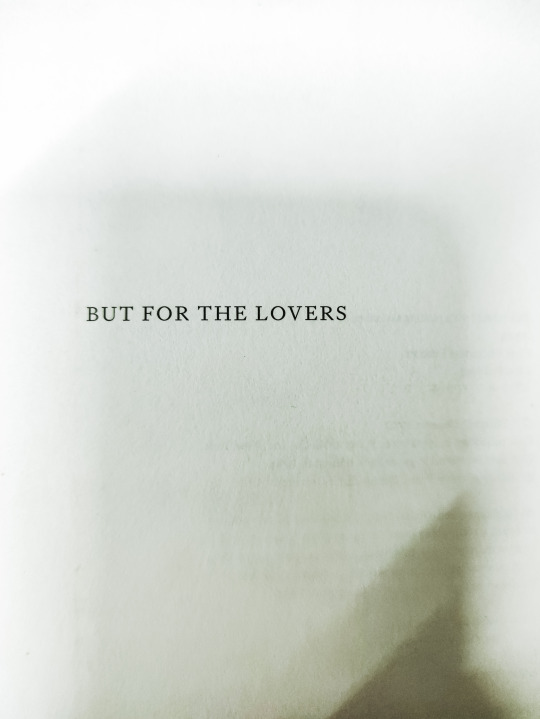
This is perhaps my most anticipated read of the year, and I’m happy to report that it did not disappoint. This novel has a lyrical, almost feverish prose that is brutal in (a lot of!) places. If you do not like flowery writing, I don’t think you’ll appreciate this.
On a sentence level, “But for the Lovers” demands a lot from the reader. The prose is dizzying, challenging, and is rife with code-switching. It is not a book that will coddle purely English speakers, which I laud. In the novel's foreword, Gina Apostol wrote that every time the Filipino employs the English language, the purpose is always subversion. BftL perfectly demonstrates this point. The way Nolledo used English in this book is very Filipino and very weaponized. And as I read, I got the sense that he was having a lot of fun writing this masterpiece. This book is not an easy read, but one that is worth the trudge.
So what is it about? “But for the Lovers” follows a cast of characters living in a rundown tenement building in a Japanese-occupied Manila at the tail end of World War II. This is a war novel with much waiting; the characters await their American “liberators.” And the reader waits too—knowing full well that when Americans do finally arrive, Manila will be razed to the ground.
The way Nolledo employs language in this book is really unique. It reads a lot like magical realism with its lyrical and flowery prose, but this book is very much grounded. And brutal. The seemingly magical things are actually happening in the physical world. For example, the opening sentence reads: “He was beginning to eat flowers, and the crescent moon was in his eyes when he awoke again.” It sounds a lot like a work of magical realism. But later in the chapter, we find that the man was literally eating flowers because he passed out under a flowering tree. And when he awoke, he saw the crescent moon. This push and pull of seemingly fantastical language against the physicality of the scenes continues throughout the novel. In magical realism, the fantastical elements are also usually employed to shield against the brutality of the physical world. In Nolledo’s novel, the brutality of the physical world disrupts the reader's enjoyment of its fantastical language. When brutality happens to the characters, it punches you in the gut.
So much trust is put in the ability of the reader. Whenever a chapter opens, the reader is plunged into the middle of the narrative and is expected to make sense of what’s happening—who’s the speaker in this chapter? Where am I? What is happening? And it’s only in the latter part of the chapter where things will start to make sense. Then, you’re on to a new chapter, and the disorientation starts again. I enjoyed trudging through the book, but can understand why people may be turned off by that.
Another marvel of this novel is that from start to finish, everything moves parallel along two realms: this is a physical novel, but it’s also very much an allegorical one. This beautifully reflects the poetic quality of our history and experiences. Of how we always seem to repeat the mistakes of the past. Of how, many years later, we seem to find ourselves in the same situations. And if we extend this to the rise of the Marcoses and the historical revisionism happening in the present… hay nako.
Which leads me to the way Nolledo wrote the novel's climactic moment: this war novel culminates in an overlap of memories. The parallel sentences hone in on the point that things that have happened before will happen again. America fooled us twice—first when they colonized us in 1899 and now in 1945 as they shelled Manila to the ground—both done in the pretense of being our liberators.
I found the allegories too in the nose at first. But thinking about it now, I’m glad the subtexts are simple and obvious, because the text itself is already challenging enough. Kung mahirap pa pati subtext san na lang ako pupulutin?
Some things I did not enjoy: I did not like the dream sequences in this novel. I did not like the woman (or, in the case of BftL, girl) as a nation trope employed. Especially since the waif who is the stand-in for the nation is worse than Maria Clara in Rizal’s novels. I don’t appreciate the sexist language (i.e., penetration), especially around the awakening of the nation’s soul. That said, I forgive Nolledo for his sexism. He’s a genius but still very much a product of his time.
The novel ends on a hopeful note, a promise of becoming, of blossoming for this nation. (Reading it today under another Marcos administration is bleak and depressing.) But one has to hold on to hope.
This novel is breathtaking, audacious, and blatantly anti-imperialist. It also tells us that the poor, the masa, carry the nation’s soul—not the educated middle class, not the wealthy landowners, not the ruthless authoritarians in power. But for the Lovers is a challenging read, but one that is well worth your time.
More photos from the book on my Instagram!
36 notes
·
View notes
Text







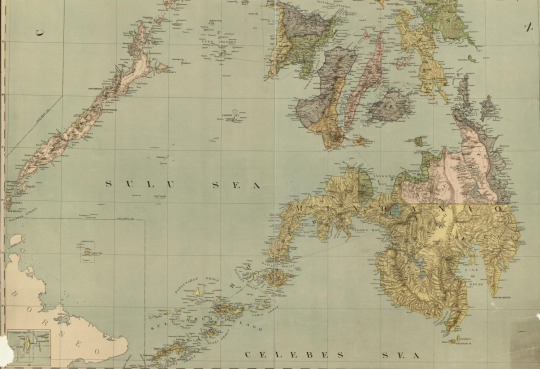
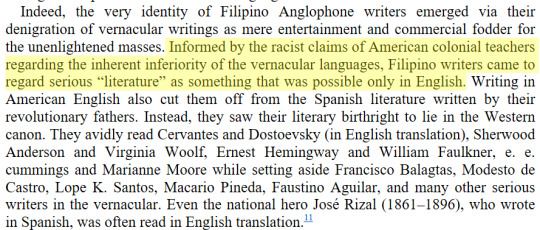



Author's Note on the American Edition of The Revolution According to Raymundo Mata, Gina Apostol / Gina Apostol's Forward and Vincente L. Rafael's Introduction to Nick Joaquin's The Woman Who Had Two Navels and Tales of the Tropical Gothic / A map of the Philippines
#philippine literature#comparatives tag#i almost included a bit from a martial law book but ultimately this is about english and the complexity of language in the philippines#the 'one more colonizer' joke re: tagalog is funny as hell tho that sounds like something my mom would get a kick out of
76 notes
·
View notes
Text
It's really interesting that in one of [Gramsci's] essays on education, he maintained that workers should be taught to read Dante. It's kind of weird because of the complexity of Dante, but his point was that no one, including workers and the general populous of nation, should be alienated from the culture production that their own world has produced. And that would be my response against the concept of reading, the question of cult in English, et cera, or that pop vs. jazz assumes. What we should do as Filipinos is strive to make as many people as possible able to read Nolledo with pleasure. And since English is also part of our lives, we need to keep moving into the direction of having a nation of radical justice that will allow all of us Filipinos to read the complexities of ourselves in our novels, in whatever language we find our novels. The received idea of "cult," even imagining that only a few people would enjoy this kind of English... I think we are limiting ourselves and our imagination for our fellow Filipinos.
Gina Apostol, in MCAD TK’s Rediscovering Nolledo: Reading But for the Lovers
64 notes
·
View notes
Text
I’ve read 23 books so far this year - more than I had expected to get to at this point, by far, and there are some real winners on the list. Top books of 2023 (so far):
1. The Candy House, Jennifer Egan
2. Five Decembers, James Kestrel
3. The Yiddish Policeman’s Union, Michael Chabon
4. The Future of Another Timeline, Annalee Newitz
5. Civilizations, Laurence Binet
6. Dead Souls, Sam Riviere
7. The Colossus of New York, Colson Whitehead
8. The Mirage, Matt Ruff
9. The Making of Incarnation, Tom McCarthy
10. The Revolution According to Raymundo Mata, Gina Apostol
11. The Ferryman, Justin Cronin
12. Titanium Noir, Nick Harkaway
13. The Anomaly, Herve Le Tellier
14. Rogues, Patrick Radden Keefe
15. The Metaverse, Matthew Ball
Books I’ve read so far this year: https://www.goodreads.com/user_challenges/39272374
1 note
·
View note
Link
New story on NPR: 4 new books by Filipino authors to read this spring https://ift.tt/1dJHxmj
0 notes
Text
Book Review: ‘La Tercera,’ by Gina Apostol
bookjubilee.com http://dlvr.it/SnQMBh
0 notes
Text
Gina Lourdes Delgado Apostol

Apostol's debut novel Bibliolepsy, published by the University of the Philippines Press, won the 1997 Philippine National Book Award for Fiction. The novel is set in Manila in the 1980s, during the dictatorship of Ferdinand Marcos up to the 1986 People Power Revolution. On its first run, the novel sold out and went out of print. It was republished in the United States by Soho Press in 2022.
Her second novel, The Revolution According to Raymundo Mata won the 2010 Philippine National Book Award for Fiction, as well as the biannual Gintong Aklat Award. It was republished in the United States by Soho Press in 2021.
Her American debut, Gun Dealers' Daughter, won the 2013 PEN/Open Book award and was shortlisted for the 2014 Saroyan International Prize.
Her 2018 novel, Insurrecto, was one of Publishers Weekly's 2018 Ten Best Books, and was shortlisted for the Dayton Literary Peace Prize.[9] Portions of her short story, “The Unintended,” which was published in the Manila Noir anthology edited by Jessica Hagedorn, appear in the novel.
1 note
·
View note
Text


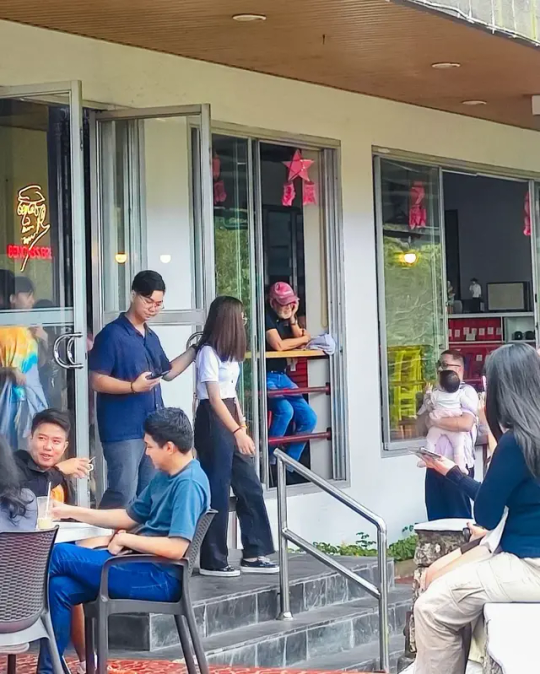

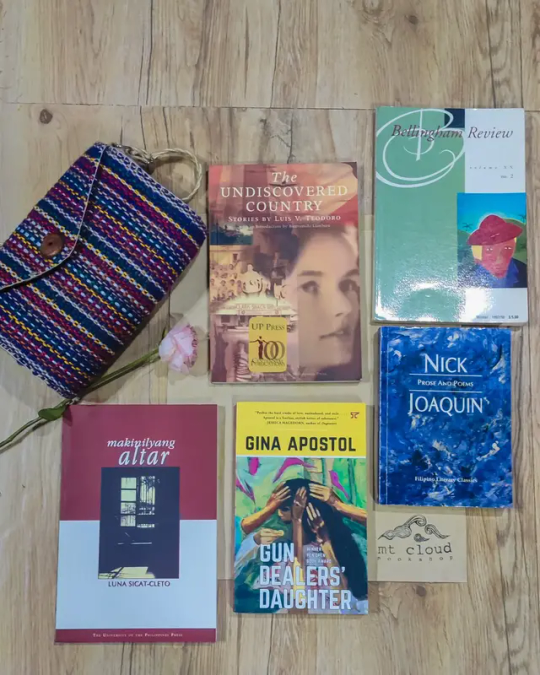




Some book and art photos from a recent trip to Baguio City🌲|
I brought The Kindness of Birds by Merlinda Bobis, but of course, I wasn't able to read it. Wishful thinking lang talaga magdala ng book on vacations eh lol. I managed to sneak-read some stories from The Secret Lives of Church Ladies, though, because I have it on ebook. So far, I'm loving it. 🤍
Another highlight of the trip was BenCab museum. The man himself was there when we went, but because I'm shy, so I did not dare to take a photo with him. I just took a photo of the legend from where I was seated. Oh well.
I also finally saw Woman with Fan by BenCab. This painting is the cover art of Gina Apostol's Insurrecto. I had to take a pic.
Of course, I had to visit Mt. Cloud! Sadly, I missed both Ninotchka Rosca and Ambeth Ocampo's talks Sayang. Anyway, I bought five books from there plus a cute bag that I got from the Night Market.
So much walking in this city! (:
15 notes
·
View notes
Text
National/Regional Authors
Dionee Villareal
Christine Sales
Yvonie Cardel
Wildon Tacdol
Vladimir Gamurot
Angel Gabriel Malinao
Lariza Estabillo
Arnel Cabungan

Jose Protacio Rizal Mercado y Alonso Realonda
The Philippines' national hero was also a prolific writer, poet, and essayist. Jose Rizal's two novels, Noli me Tangere and El Filibusterismo were social commentaries that sharply revealed the injustices of Spanish colonization while praising the Filipino in his most natural state.

Francisco Balagtas
Francisco Balagtas y de la Cruz (April 2, 1788 – February 20, 1862), commonly known as Francisco Balagtas and also as Francisco Baltasar, was a Filipino poet and litterateur of the Tagalog language during the Spanish rule of the Philippines. He is widely considered one of the greatest Filipino literary laureates for his impact on Filipino literature. The famous epic Florante at Laura is regarded as his defining work.

Carlos Bulosan
Carlos Sampayan Bulosan (c. 1911– September 11, 1956) was a Filipino American author, poet, and activist. A chronicler of the Filipino American experience during the 1930s - early 1950s, he is best remembered for his semi-fictional, semi-autobiographical novel America Is In the Heart (1946) — a staple in American Ethnic Studies and Asian American Studies classes.

F. Sionil Jose
Francisco Sionil José was a Filipino writer who was one of the most widely read in the English language. A National Artist of the Philippines for Literature, which was bestowed upon him in 2001, José's novels and short stories depict the social underpinnings of class struggles and colonialism in Filipino society.

Gina Apostol
Gina Lourdes Delgado Apostol (born 1963) is a Filipino-born writer based in the United States. Gina Apostol.

Nick Joaquin
He was well known as a historian of brief Golden Age of Spain in the Philippines, as a writer of short stories suffused with folk Roman Catholicism, as a playwright, and as a novelist. Joaquin wrote his works in English. The novel The Woman Who Had Two Navels (1961) examines his country's various heritages.

Lualhati Bautista
Lualhati Torres Bautista (December 2, 1945 – February 12, 2023) was a Filipina writer, novelist, liberal activist and political critic. Her most popular novels include Dekada '70; Bata, Bata, Pa'no Ka Ginawa?; and ‘GAPÔ.

James Cooke Brown
James Cooke Brown (July 21, 1921 – February 13, 2000) was an American sociologist and science fiction author. He is notable for creating the artificial language Loglan and for designing the Parker Brothers board game Careers.

Jose Dalisay Jr.
Jose Y. Dalisay Jr. (born January 15, 1954) is a Filipino writer. He has won numerous awards and prizes for fiction, poetry, drama, non-fiction and screenwriting, including 16 Palanca Awards.

Martin Abellana
was a Filipino Visayan writer. He was a teacher by profession. In the years 1956 to 1958, he was president of the LUDABI, a group of writers in Cebuano. His novels are characterized by a concern for the working class.
1 note
·
View note
Text
EY thanks for the tag!!
Last Song:
Dahan-dahan (extended version) by Lola Amour
Currently Reading:
The Revolution According to Raymundo Mata by Gina Apostol; lowkey the footnotes are the best part
Currently Watching:
Sweet Tooth; I just realized the second season’s up so I’m trying to watch that
Current Obsession:
I’m stuck in dirt children land but aside from that uh... if you’re lucky you’ll get specifically FMA 2003 brainrot from me on Discord at 3 AM in the morning???
Tagging @gilbertgeilschmidt , @bubbleteahime , @seaofolives , and @kyuhu
Tag 9 people you'd like to get to know better. Thanks for the tag, @icannotreadcursive! :D
Last song
Planet of the Bass by DJ Crazy Times ft. Ms. Biljana Electronica
Currently reading
Still the same books from the last tag game (Still Straight and Farm Boys)
Currently watching
Was rewatching Good Omens s2 again before I left for England, but since I was rewatching the Simpsons again on the airplane, I guess it was that one :P
Current obsession
Brokeback Mountain and uhhh...I dunno! Wyoming!
I tag @alifeasvivid, @morgenlich, @mediumorange, @belalegoshi, @peachy-snacks, @thebasementgirl, @hwsforeignrelations, @gyllenism, and @ whoever wants to do this
70 notes
·
View notes